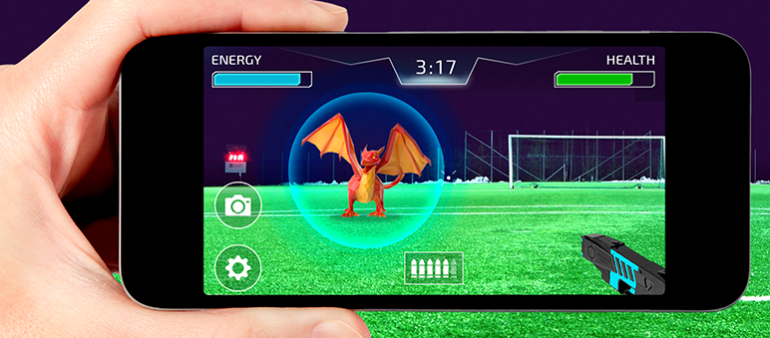Real-world experience is the next frontier that video games are very much set for, especially with big advancements in Augmented Reality (AR) already in the making. Pokémon Go, needs no introduction though, is an AR-powered game which has taken the video game industry by storm and has set the wheels in motion for AR games to enter the mainstream and become a global phenomenon.
Augmented reality development companies, in a nutshell, integrate digital information with real physical environment in real time to enhance user’s real-world experience. Unlike virtual reality (VR) which creates a completely virtual world, AR uses the existing environment to overlay new information on top of it. There’s not even a shred of doubt that the time is ripe for AR games and we will soon see more and more AR game apps invading our smartphones fast.
Fans of Call of Duty and Counter Strike are already embracing immersive gaming experience of battling with their enemies in the real world. It really feels so cool to face your enemy in the real world as gaming becomes very realistic.
Expected market growth of AR games in coming years
According to a research by Infoholic Research LLP, a global market research and consulting company, the AR gaming market will see rapid growth during the forecast period 2017-2023. The research expects AR gaming market to grow at the compound annual growth rate (CAGR) of 154.2% and touch the $284bn mark by 2023. The factors that will drive the growth of AR gaming market are growing number of mobile gamers, Internet penetration, advancements in game technologies and innovations in IoT.
So, the opportunities are huge for AR game developers to provide immersive gaming experience that gamers now expect and in return make big money from it.
What all it takes to build AR Games and how LS Helps
Location based AR games, like Pokémon Go, use GPS and other position detectors to mark your location and move animated game objects. Your smartphone camera perceives your surroundings and detects objects in order to provide an enhanced real-world experience of playing the game. Game engines, like Unity, use AR camera to help you spot the target from any angle regardless of the position of the smartphone.
While there are various game engines (like Unreal Engine and Vuforia) to build AR games, Unity is trusted the most when it comes to build AR games or any video game for that matter. For AR games, Unity supports all the latest and greatest platforms including Oculus Rift, Steam VR/Vive, Playstation VR, Gear VR, Microsoft HoloLens, and Google’s Daydream View. Unity is mostly used to create video games for consoles and computers though.
Logic Simplified (LS), the top game development company has hands-on experience of using Unity to build AR for video games. LS also helps build AR games for masses using Google’s ARCore and Apple’s ARKit. Unity supports both ARCore and ARKit, and have all the tools in the editor that are required to create AR content for video games. Other game engines, like Unreal Engine and Vuforia, also support ARCore and ARKit that LS, with over 10 years of experience in game development industry, has the competency to use in building next-gen AR games.
LS builds AR games for various platforms like PCs (Mac, Windows and Linux), smartphones & tablets, AR headsets, Xbox, Playstation and many more.
To consult and build your AR game for today’s gamers, please contact us at enquiry@logicsimplified.com. We promise to get back to you shortly.
 Get a Quote
Get a Quote













